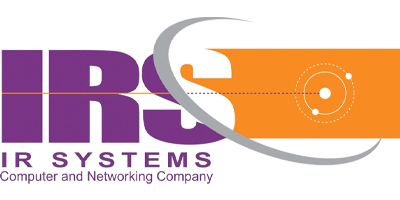Future-Proof Your Business with SAN Storage Solutions

As businesses grow, so does the demand for efficient data storage solutions. Traditional storage methods can no longer meet the increasing need for high performance, scalability, and security. That’s where SAN storage comes in, providing an advanced solution for enterprises to manage large volumes of data while ensuring business continuity with reliable backup solutions. In this article, we’ll explore what this storage is for, how it works, and why it’s a game-changer for businesses. What is SAN Storage? An Overview Storage Area Network (SAN) is a specialized high-speed network that connects storage devices to servers. Unlike direct-attached storage (DAS) or network-attached storage (NAS), SAN storage operates at the block level, offering faster and more efficient access to data. In a SAN setup, multiple storage devices are connected to a central network, allowing servers to access storage as if it were local. This setup enhances data transfer speed and improves overall system performance. Key features of storage include: High Performance: Offers low latency and high-speed data transfer. Scalability: Easily accommodates growing storage needs. Reliability: Provides redundancy and failover mechanisms for data protection. How SAN Storage Works SAN storage works by separating storage resources from the server, creating a dedicated network for data transfer. This network connects servers to storage devices through a fabric layer, typically using Fibre Channel or iSCSI protocols. The fabric layer ensures efficient communication between servers and storage arrays, making data retrieval faster and more reliable. Here’s a breakdown of the process: Storage Devices: These can be hard drives, SSDs, or other storage media. Fabric Layer: The network infrastructure connecting servers and storage devices. Servers: The machines that access and manage data stored on the SAN. By isolating storage traffic from regular network traffic, this storage significantly reduces latency and enhances data access speeds. Why Choose SAN Storage Over Other Solutions? Choosing the right storage solution is crucial for any business aiming to optimize data management. Here’s how SAN storage compares to other options: Feature Direct-Attached Storage (DAS) Network-Attached Storage (NAS) SAN Storage Performance Limited Moderate High Scalability Limited Moderate High Data Protection Basic Advanced Enterprise-grade Backup Solutions Manual Automated Seamless Integration SAN storage stands out due to its high performance, scalability, and built-in data protection features, making it ideal for businesses handling large amounts of critical data. SAN Storage as a Reliable Backup Solution Data loss can be catastrophic for businesses. That’s why having a robust backup solution is essential. It offers advanced backup capabilities, ensuring that your business data remains safe and accessible at all times. Here are some key backup features provided by SAN storage: Snapshot Backups: SAN systems can take frequent snapshots of data, creating point-in-time copies that allow quick recovery in case of data corruption. Data Replication: This storage supports data replication across different locations, ensuring that your data is always backed up in a secure environment. Automated Backups: Automate backup processes to reduce human error and ensure consistent data protection. With these features, businesses can minimize downtime and prevent data loss, ensuring continuous operations. The Role of QASAN Storage in Modern Data Management When discussing SAN storage, it’s essential to mention QSAN storage, a unique variation of SAN technology designed to offer even more robust performance and reliability. QSAN storage integrates advanced features such as: High Availability: Ensures minimal downtime with failover mechanisms. Data Deduplication: Reduces storage needs by eliminating duplicate data. Advanced Security: Protects data against unauthorized access and cyber threats. These features make QSAN storage an ideal choice for organizations looking to optimize their data management strategies. Benefits of Implementing SAN Storage Adopting storage offers numerous advantages for businesses, especially those that rely on large-scale data processing. Here are some key benefits: 1. Enhanced Performance By creating a dedicated network for storage traffic, it minimizes latency and boosts data transfer speeds. This is particularly beneficial for applications that require high I/O performance. 2. Scalability As businesses grow, their data storage needs evolve. This storage allows organizations to add more storage capacity without disrupting existing systems, ensuring seamless scalability. 3. Data Protection With built-in backup solutions, SAN storage ensures that data is always protected. Features like snapshots and data replication provide businesses with peace of mind, knowing that their data is safe. 4. Business Continuity In the event of hardware failure or cyber-attacks, SAN storage ensures quick data recovery, minimizing downtime and maintaining business operations. Choosing the Right SAN Storage Solution When selecting this storage system, businesses should consider their specific needs and future growth plans. Here are some factors to keep in mind: Storage Capacity: Ensure that the solution can handle current and future data volumes. Performance Requirements: Choose a system that meets your performance needs for critical applications. Backup and Recovery Features: Look for advanced backup solutions like automated backups, snapshots, and data replication. Security Measures: Ensure that the system offers robust security features to protect against data breaches. Common Use Cases for SAN Storage This storage is widely used across various industries due to its high performance and reliability. Here are some common use cases: Enterprise Applications: It supports mission-critical applications that require high-speed data access. Virtualization: It enhances performance in virtualized environments by providing fast and reliable storage. Data Backup: Businesses rely on this storage as a primary backup solution to protect their data. Disaster Recovery: With features like data replication, it ensures quick recovery in disaster scenarios. FAQs About SAN Storage What is the difference between SAN storage and NAS storage? It operates at the block level, providing faster and more efficient data access. NAS storage, on the other hand, operates at the file level and is more suitable for file sharing. Can SAN storage be used as a backup solution? Yes, it offers advanced backup features such as snapshots, data replication, and automated backups, making it a reliable backup solution for businesses. What is QSAN storage? QSAN storage is a variation of SAN technology that offers enhanced performance, high availability, and advanced security features. How scalable is SAN storage? This storage is highly scalable,
SAN Storage System: High Performance & Growth
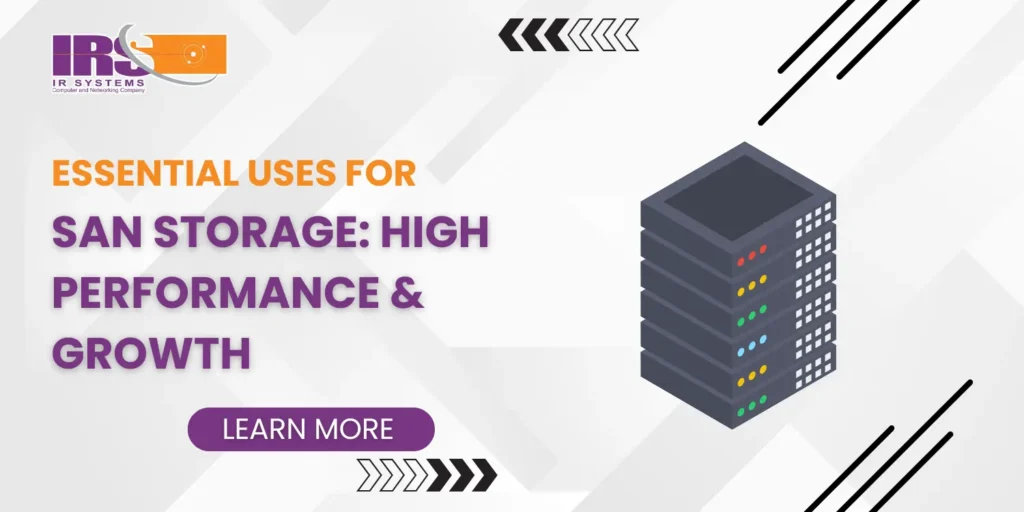
As data needs continue to expand, businesses face the challenge of finding efficient, scalable storage solutions. SAN Storage has become a sought-after option for organizations that require fast, reliable, and scalable data access. In this article, we’ll delve into when SAN should be used, how it stands apart from other storage solutions, and why it’s a valuable investment for businesses looking to streamline data management. We’ll also cover related services, such as backup solutions, and highlight QSAN XS 3316 for its remarkable features. What is SAN Storage? Storage Area Network (SAN) is a high-speed network of storage devices accessible to multiple servers. Unlike other storage options, SAN Storage offers dedicated resources for critical data, making it a prime choice for enterprises with high demands on storage performance, flexibility, and security. When to Consider SAN Storage for your business Are you wondering if this is the right time for choosing SAN Storage for your business? Here are some scenarios when SAN is especially beneficial: 1. High-Performance Requirements SAN is ideal for businesses needing high-performance storage. Its architecture supports quick access to large data volumes, making it suitable for applications where speed and reliability are essential. 2. Large Data Management For industries managing massive datasets like healthcare, finance, and media, SAN offers the necessary scalability. With SAN, expanding storage capacity doesn’t compromise performance, and data growth can be accommodated with ease. 3. Centralized Backup Solutions SAN is highly compatible with centralized backup solutions. By using SAN, businesses can back up all data centrally, reducing the risk of data loss and ensuring consistent data protection across departments. 4. Applications Requiring High Availability SAN provides redundant paths to data, ensuring high availability. If one part of the system fails, other paths can quickly pick up the load, providing a continuous service that keeps critical applications running smoothly. 5. Virtualized Environments For businesses running virtualized environments, SAN is an excellent choice. Virtualization puts high demand on storage systems, and SAN can manage these demands, providing reliable and scalable storage solutions for virtual machines. Key Benefits of SAN Storage You can explore our SAN storage system options at IR Systems, it has numerous key benefits, making it highly sought after by businesses of all sizes: Data Security and Reliability: With SAN, data is stored in a highly secure network, reducing the chances of unauthorized access or accidental deletion. Scalability: SAN systems can scale alongside your business, so you won’t need to worry about frequent upgrades or limitations on capacity. Efficient Backup Solutions: SAN systems are designed to work seamlessly with backup software, simplifying the data backup process. Exploring Backup Solutions Data loss can be catastrophic for any business, making effective Backup Solutions an essential part for any business. With SAN, organizations can streamline the backup process through centralized storage. Backup data can be easily transferred to secure storage, ensuring data integrity even in case of system failure. By integrating a Backup Solution with SAN, businesses can better protect their critical data assets, reducing the risk of data loss and improving recovery time. QSAN XS 3316: A Noteworthy SAN Storage Solution When looking for advanced SAN solutions, the Qsan XS 3316 is a standout. This model offers: High Availability: Redundant power supplies and dual controllers prevent system failure. Scalability: Designed for expansion, the Qsan XS 3316 accommodates future growth without performance loss. Easy Management: With intuitive management features, this model is ideal for businesses needing efficient data access and control. For companies considering SAN Storage, Qsan XS 3316 provides an optimal mix of speed, scalability, and security. Learn more about this solution on the IR SYSTEM website. SAN vs. Other Storage Solutions: A Brief Comparison Here’s a comparison to illustrate why SAN might be the ideal choice for specific business needs: Feature SAN Storage NAS Storage DAS Storage Best for High-speed, centralized storage File storage, home use Individual device storage Performance High Moderate High Scalability High Moderate Limited Data Access Block-level, fast File-level, moderate Direct connection Applications Mission-critical, virtualized environments Small businesses, departments Personal use, small businesses For high-performance and scalability needs, SAN outshines other storage types, especially in enterprise settings where data is critical. Frequently Asked Questions (FAQs) What makes SAN different from NAS? SAN operates on a block-level system, which makes data access faster compared to NAS. SAN is better suited for applications requiring high-speed data transfers. Is SAN Storage scalable? Yes, SAN is highly scalable. It allows for the addition of storage capacity without affecting system performance. How does SAN improve backup efficiency? SAN facilitates centralized data storage, which makes data backup faster and more streamlined, reducing the risk of data loss. Is SAN a good choice for virtualized environments? Absolutely. SAN Storage is ideal for virtualized environments due to its ability to handle high storage demands and provide uninterrupted data access. Final Thoughts: In today’s data-driven world, having a reliable storage solution is essential. SAN Storage is an optimal choice for businesses that prioritize high performance, scalability, and data security. With products like the Qsan XS 3316 and integrated Backup Solutions, your organization can stay prepared for future growth and data demands. IR SYSTEM offers the latest in SAN technology, making it easier for businesses to adopt secure, efficient, and scalable storage. Discover how our solutions can elevate your data management by contacting us today. Let us support your business growth with customized SAN solutions tailored to your needs.
Compare SAN and NAS Storage Solutions for Your Business
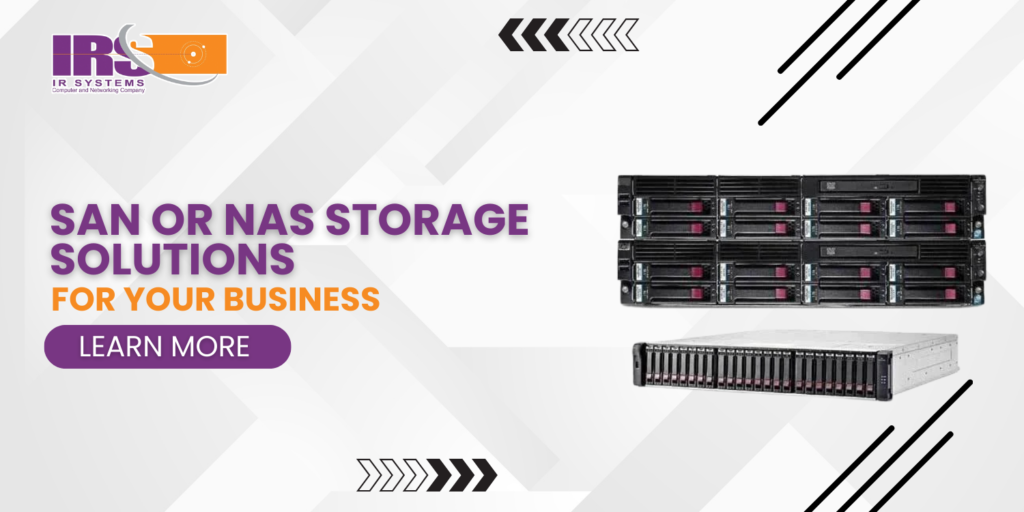
In today’s digital landscape, businesses of all sizes rely on robust data storage solutions to manage vast amounts of information securely and efficiently. Two of the most popular storage solutions are Storage Area Network (SAN) and Network Attached Storage (NAS). In this guide, we’ll delve into the specifics of SAN Storage and NAS Storage, comparing their features, benefits, and use cases to help you make an informed choice for your business. Let’s explore how each storage solution stacks up in terms of scalability, performance, cost, and ease of management. What is SAN Storage? SAN Storage refers to a network-based storage solution, typically used by organizations with extensive data storage needs. SAN uses a high-speed network to connect storage devices, enabling efficient and secure access to data across different servers. This setup provides a centralized storage system, often preferred by large businesses for its speed, reliability, and flexibility in handling massive data volumes. Key Features of SAN Storage High-Speed Performance: SAN is designed for rapid data transfer, ideal for businesses requiring quick access to large datasets. Centralized Management: With a single point of control, managing storage becomes more straightforward. Reliability and Redundancy: SAN systems often include features like mirroring and backup, ensuring minimal downtime and data protection. Scalability: Businesses can expand SAN systems as their data needs grow without disrupting operations. What is NAS Storage? Network Attached Storage (NAS) is another popular solution, especially suitable for smaller-scale storage needs. Unlike SAN, NAS connects directly to the local area network (LAN) and allows multiple devices to access files over the network. While NAS may not offer the same speed as SAN, it’s more affordable and easy to set up, making it a viable option for smaller businesses or home office setups. Key Features of NAS Storage Cost-Effective: NAS is generally less expensive than SAN and requires fewer resources. Ease of Use: Easy to install and manage, NAS systems are user-friendly for businesses with limited IT support. Data Sharing: NAS enables file sharing across multiple devices, ideal for collaborative work environments. Good for Small Data Volumes: While it lacks the high-speed performance of SAN, NAS handles moderate data volumes efficiently. SAN Storage VS NAS Storage: Key Differences Here’s a breakdown of the main differences between SAN Storage and NAS storage: Feature SAN Storage NAS Storage Performance High-speed, ideal for large datasets Moderate speed, suitable for file sharing Cost Higher initial cost with long-term ROI Lower cost, suitable for smaller budgets Scalability Highly scalable for growing data needs Limited scalability Installation Complexity Requires IT expertise and setup Easy to install and manage Best Use Case Enterprises with large data centers Small to medium businesses or home use When to Choose SAN Storage for Business Choosing the right storage solution depends on the scale and nature of your business. SAN storage is ideal for businesses requiring: High Performance and Low Latency: If your applications demand high data transfer rates and low latency, SAN storage delivers this through dedicated, high-speed networking. Centralized Data Management: SAN provides a robust solution for centralized data storage, making it ideal for businesses with complex data structures. Backup Solutions: Many organizations using SAN benefit from integrated backup features, providing efficient data recovery options. How SAN Storage Supports Backup Solutions In a competitive business environment, data loss can have severe repercussions. SAN storage is not only about efficient data access but also robust Backup Solutions. With SAN, businesses can set up dedicated backup systems that ensure data redundancy, minimizing the risk of data loss. At IR Systems, we offer SAN Storage that includes top-tier backup options tailored to safeguard your business data. Advantages and Disadvantages of SAN and NAS Storage Advantages of SAN Storage High Performance: Meets the demands of data-intensive applications. Centralized Control: Offers centralized data management, improving organization and security. Data Protection: Provides redundancy options and efficient Backup Solutions. Disadvantages of SAN Storage Cost: Higher setup costs may deter smaller businesses. Complexity: Requires skilled IT resources for installation and management. Advantages of NAS Storage Affordability: Lower initial investment and maintenance costs. Easy Management: Simple setup without extensive IT support. Disadvantages of NAS Storage Limited Scalability: Expanding NAS systems can be challenging for larger data volumes. Lower Performance: May not meet the demands of applications needing high data transfer speeds. Asustor NAS Storage: For businesses exploring NAS options, Asustor NAS Storage is a robust solution. Asustor NAS devices offer high-performance capabilities, affordable options, and a user-friendly interface. These systems support backup solutions, ensuring that businesses have access to efficient data recovery and protection options. Asustor NAS storage offers valuable features for data sharing and is an ideal choice for small to medium-sized businesses looking to streamline their storage without the complexities of SAN. FAQs About SAN and NAS Storage What are the main differences between SAN and NAS storage? SAN storage operates over a high-speed network, offering centralized storage for large datasets. NAS, however, connects directly to a LAN and is more suitable for file sharing in small to medium environments. Which is more cost-effective, SAN or NAS storage? NAS storage is typically more cost-effective, while SAN requires a higher initial investment. SAN’s long-term ROI can be beneficial for large businesses, while NAS is ideal for smaller budgets. Can you use both SAN and NAS in a single setup? Yes, many businesses implement both SAN and NAS for a hybrid solution, allowing them to benefit from the high performance of SAN and the accessibility of NAS for less data-intensive tasks. How does SAN storage support backup solutions? SAN storage often integrates backup solutions, enabling businesses to maintain data redundancy and recover data in case of system failure. Is Asustor NAS storage a good choice for small businesses? Yes, Asustor NAS storage provides affordable, user-friendly options, making it a reliable choice for small businesses needing efficient data management. Choosing the Right Storage Solution for Your Business Selecting between SAN and NAS depends on your business’s unique needs. For high-speed performance, centralized data management, and advanced backup solutions, SAN Storage is an
How to Use SAN Storage for Efficient Data Management
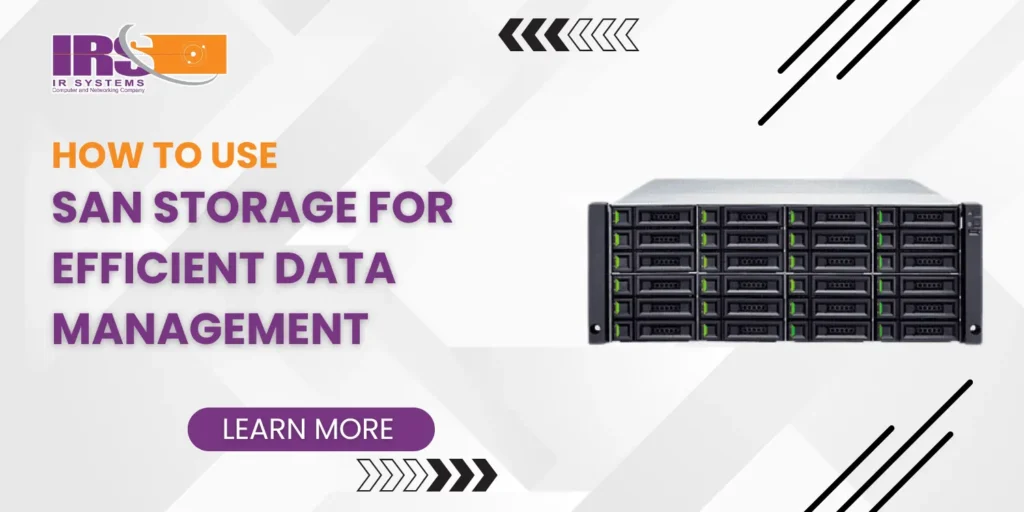
Data storage and management are critical to maintaining smooth business operations. With SAN Storage, companies can centralize and secure their data effectively. This blog explores the fundamentals of SAN, its advantages, and how it differs from traditional storage options, plus offers some insights into backup solutions to ensure data safety. What is SAN Storage? A Storage Area Network (SAN) connects multiple storage devices to create a shared pool of data storage. SAN storage, unlike typical network-attached storage (NAS), is designed for high-speed data transfer and can handle significant workloads across a larger network of servers. This makes SAN an ideal choice for businesses needing reliable data storage solutions with fast, secure access to critical information. Why Consider SAN for your business? For businesses operating, having a reliable storage system can save both time and resources. SAN offers benefits such as: Enhanced Data Availability: With SAN, you can access data quickly, making it ideal for organizations with large databases. Scalability: As your business grows, SAN storage can easily be expanded to meet higher data demands. Redundancy: It provides backup features that safeguard against data loss, ensuring business continuity. Key Advantages of SAN Implementing SAN Storage offers multiple advantages that can enhance business productivity. Here are some of the key benefits: High-Speed Data Access: SANs use fiber or high-speed connections that allow faster access than traditional storage systems. Centralized Storage Management: With centralized control, you can manage storage resources efficiently from one location. Improved Security and Backup: Security protocols in SAN setups protect sensitive data from unauthorized access. SANs also offer reliable backup options. How Does SAN Storage Differ from NAS? SAN and NAS (Network-Attached Storage) are both valuable storage options, but each serves different needs. Data Transfer Speed: SAN is typically faster, making it suitable for applications requiring quick access to large amounts of data. Deployment: NAS is easier to set up, but SAN offers greater control and customization. Data Access: SAN provides block-level access, while NAS works with file-level access, making SAN ideal for large database-driven environments. Backup Solutions for SAN Storage For businesses using SAN, incorporating reliable backup solutions is essential to protect data from unexpected losses. Automated Backups: One of the most practical options is setting up automated backups. Automated backup solutions can help ensure data is regularly backed up without manual intervention. Cloud-Based Backup Solutions: Leveraging cloud backup allows for off-site storage, adding another layer of security for your SAN data. Cloud backup is highly scalable and can be customized to suit specific requirements. QSAN Storage: QSAN storage solutions are also compatible with SAN, offering an additional level of reliability. Designed with advanced technology, QSAN provides stable and secure storage, ensuring data integrity and quick recovery options in case of failures. With these backup solutions, your business in Lahore can rest assured that critical data is secure, accessible, and easily recoverable. How to Use SAN Storage Efficiently? Using SAN Storage efficiently can enhance your data management capabilities. Here are some tips for optimizing SAN usage: Plan Your Storage Layout: Organizing data into logical segments or partitions improves access and management. Set Access Controls: Implementing access controls can limit data access, enhancing security. Regularly Monitor Performance: Periodic assessments allow for performance tuning, helping you manage and predict storage needs. What is QSAN Storage? QSAN Storage provides high-performance, reliable, and secure storage solutions ideal for businesses requiring stable and efficient data management. Known for its robust architecture, QSAN integrates seamlessly with SAN systems, offering a scalable and flexible option for data-intensive applications. Key Features of QSAN Data Integrity: QSAN ensures data accuracy and reliability, even during high-volume transfers. High Availability: Built-in redundancy and failover features minimize downtime. Ease of Management: User-friendly interfaces make it easy to monitor and manage storage resources. QSAN Storage is an optimal choice for businesses that prioritize data security, availability, and scalability. FAQ What is the main advantage of SAN storage over NAS? SAN offers high-speed data access, making it ideal for environments that require quick, frequent access to large volumes of data. Can you use SAN storage for backup solutions? Yes, SAN storage can support various backup solutions, including cloud-based and automated backups. What is QSAN, and how does it work with SAN storage? QSAN provides reliable storage technology designed to integrate with SAN for secure and efficient data storage. Is SAN storage suitable for small businesses? While SAN is often used by larger businesses, small businesses with high data needs can also benefit, especially if scalability and fast access are priorities. Final Thoughts: For businesses looking for secure and scalable data storage solutions, SAN Storage offers unparalleled advantages. From fast data access to efficient backup solutions, SAN is an ideal choice for companies focused on data integrity and availability. Explore our website to find the ideal SAN setup for your business needs.
NAS Storage Solution- A Comprehensive Guide
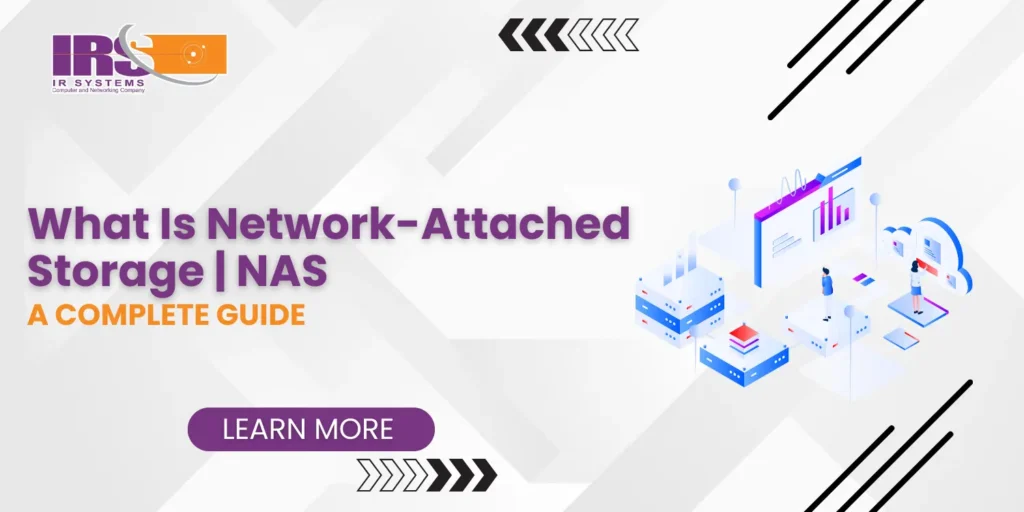
In today’s digital age, managing data securely and effectively is crucial for businesses of all sizes. Network-Attached Storage is an efficient solution that enables seamless data storage and access across devices on a local network. By using NAS, organizations can centralize data management, improve data security, and enhance collaboration among team members. For businesses in Lahore, implementing NAS storage systems can provide a range of practical benefits, from improved backup solutions to secure access for remote work. Let’s dive into the key aspects of NAS, its uses, and how it compares to other storage solutions like SAN (Storage Area Network). How NAS Storage Works NAS devices are typically small storage units connected to a network, accessible to multiple users and devices. Instead of storing files on individual computers, a NAS device allows users to store data centrally. This centralized approach enhances data accessibility and security, providing a scalable solution for growing businesses. Key Functions of NAS Storage: Data Centralization: All files and data are stored in one location, making it easy for teams to access, share, and manage files. Accessibility: NAS devices can be accessed remotely, providing flexibility for employees working from different locations. Scalability: NAS systems are highly adaptable, allowing users to increase storage capacity as their data needs grow. Benefits of Using NAS Storage in Lahore Using NAS or SAN storage is ideal for businesses aiming to streamline their data management without investing in extensive IT infrastructure. Here are some key benefits of NAS for organizations: Cost-Effective: NAS systems offer high data storage capacity at a fraction of the cost of larger data management systems. Easy Setup: Unlike SAN Storage solutions, NAS devices are generally simpler to set up and maintain, which makes them ideal for small to medium-sized businesses. Enhanced Collaboration: By providing a central repository for files, NAS improves collaboration, as all team members can access updated files in real-time. Security: NAS systems are equipped with features like data encryption and password protection, making them secure for sensitive data. NAS vs. SAN Storage: Which Is Right for You? Both NAS and SAN (Storage Area Network) storage solutions aim to improve data management, but they work differently and suit different needs. Feature NAS Storage SAN Storage Setup Complexity Easy to set up Requires professional setup Data Access Suitable for file-based access Ideal for block-level access Cost Affordable for small to mid-sized Expensive, suitable for larger organizations Scalability Scalable for growing businesses Scales well but at higher costs Why Choose NAS for Backup Solutions? For businesses in Lahore or even in other areas, backup solutions are essential to protect against data loss. NAS is an excellent option for backing up important files, offering both real-time and scheduled backup options. Here are some of the reasons NAS makes for an effective backup solution: Automated Backups: NAS devices support automatic backups, reducing the risk of human error. Data Redundancy: NAS allows for redundant storage options, safeguarding data in case of drive failure. Remote Backup: NAS systems can sync data to off-site locations, adding an extra layer of protection against local data loss. For those needing comprehensive backup solutions, NAS is a flexible, affordable, and secure option to consider. Exploring QNAP Storage for Advanced Needs One of the leading brands in the NAS industry is QNAP. Known for its reliability and advanced features, QNAP offers a range of NAS devices suitable for personal, business, and enterprise use. Key Features of QNAP Storage: Multimedia Support: Ideal for businesses that handle multimedia files, such as graphic design and video production firms. Virtualization: QNAP NAS systems support virtual machines, making them perfect for IT teams testing software or running virtual environments. Comprehensive Data Protection: QNAP storage provides powerful data protection tools like snapshot technology, which ensures that data remains safe in case of cyber-attacks. To explore QNAP storage options or find backup solutions, visit IR Systems, a trusted provider of high-performance NAS storage solutions. How NAS Storage Can Benefit Your Business Investing in NAS storage can provide significant returns in efficiency, data security, and collaboration. Here’s how NAS storage can benefit businesses of different sizes: 1. Small Businesses For small teams or startups, NAS offers an affordable solution to centralize data without investing in costly server infrastructure. 2. Medium-Sized Businesses Medium-sized businesses can benefit from NAS’s scalability, allowing them to add more storage as their data needs expand. 3. Large Enterprises Larger organizations can integrate NAS with other storage solutions, such as SAN, to create a hybrid environment that optimizes data access and storage across departments. When to Use NAS Storage Over Other Solutions NAS storage is not a one-size-fits-all solution. It’s ideal for: File Sharing: If your business relies heavily on file sharing, NAS is perfect due to its central file access. Backup and Recovery: NAS provides robust backup options, ideal for businesses focused on data protection. Remote Access Needs: NAS devices support remote access, making them useful for teams with employees working from home or other locations. Important Considerations When Choosing NAS Storage If you’re considering NAS storage, keep these points in mind: Storage Capacity: Choose a NAS device that allows for storage expansion as your data needs grow. Data Security: Look for NAS systems that offer encryption and advanced security protocols. Compatibility: Ensure that the NAS system you choose is compatible with your business’s operating systems and software. FAQs About NAS Storage What is the difference between NAS and SAN? NAS is ideal for file sharing across a network, while SAN is designed for block-level access, which is faster but requires more setup and is more expensive. How secure is NAS storage? NAS storage systems are generally secure, offering encryption, password protection, and even dual authentication options on some devices. Can you use NAS for remote access? Yes, NAS devices support remote access, allowing team members to access files from anywhere, making it a great choice for flexible work environments. Is QNAP a good choice for NAS? Yes, QNAP is known for its robust NAS solutions that come with advanced
SAN Storage Solutions- Reliable Secure Business Data Solution

In today’s fast-paced digital landscape, safeguarding business data is essential. Companies need robust backup solutions to ensure critical information is secure and readily accessible in case of unexpected data loss. With the right systems in place, including SAN Storage and network storage solutions, businesses can protect their operations from downtime, cyber-attacks, and other disruptions. In this blog, we explore various backup solutions, the role of SAN storage, and how IR SYSTEM can help you find the best fit for your business. Why Backup Solutions Matter for Businesses? Backing up data is no longer optional—it’s crucial. Business data is vulnerable to risks like accidental deletion, hardware failure, and cyber threats. Without a solid backup solution, companies face costly down-times and potential data loss. Investing in effective storage solutions offers: Data Security: Protects against accidental deletions and system failures. Business Continuity: Ensures quick recovery in case of disasters. Legal Compliance: Helps meet industry standards and regulatory requirements. Companies are now adopting more advanced storage options, including SAN Storage and network storage, which offer high-capacity, secure data backup solutions. Understanding SAN Storage and Its Benefits SAN Storage, or Storage Area Network, is a high-performance network that consolidates multiple storage devices into a central pool. This setup is especially beneficial for companies with large data volumes requiring secure and fast access. SAN Storage is a popular choice for businesses that need scalable, efficient, and reliable data storage. Key benefits of SAN storage include: Centralized Data Access: SAN storage provides a central point for data, making it easy to manage and access. Scalability: Businesses can expand storage capacity without replacing existing infrastructure. High Performance: SAN is designed to handle heavy workloads and provides faster access to data than traditional storage methods. At IR SYSTEM, we offer a range of SAN Storage solutions to meet different business needs. Our team can help assess your requirements and recommend a SAN solution that fits your business goals and budget. Network Storage Backup: A Reliable Solution For businesses looking for a more versatile option, network storage backup is another excellent choice. This type of backup is often more flexible, allowing access to data across different locations and devices. Network storage solutions are ideal for smaller businesses or organizations that require shared storage for multiple users. With network storage backup, you benefit from: Ease of Access: Network storage allows multiple users to access data from anywhere, enhancing collaboration. Data Synchronization: Changes made in the network storage are updated in real time, ensuring that all users have access to the latest information. Cost Efficiency: Compared to SAN storage, network storage is often more affordable, making it suitable for smaller companies with tighter budgets. IR Systems can guide you through choosing the right backup solutions that balance performance with affordability, ensuring your business remains secure and agile. Choosing the Right Backup Solution for Your Business When selecting a backup solution, understanding your company’s data needs is critical. Ask yourself: How much data do we store? For large data volumes, SAN Storage might be the best choice. How important is data access speed? If quick access is a priority, SAN solutions provide high-speed data access. What’s our budget? Network storage backup might be a more cost-effective solution, while still providing robust security and ease of access. Essential Features to Consider When Choosing Backup Solutions Whether you’re considering SAN storage or network storage backup, certain features are essential in a reliable backup solution. Look for: Data Encryption: Ensures data remains secure during transfer and storage. Automated Backup Scheduling: Reduces the risk of human error by automating the backup process. Data Recovery Options: Allows quick restoration of files in case of accidental deletions or hardware failure. Scalability: Your storage needs will grow with your business, so choose a solution that can expand easily. Technical Support: Backup solutions require setup and maintenance; having access to support can be invaluable. SAN Storage vs. Network Storage Backup: Which is Better? Both SAN storage and network storage backup have their advantages, but the right choice depends on your business needs: SAN Storage is ideal for larger businesses with significant data and high-speed requirements. Its centralized design and scalability make it perfect for companies experiencing rapid data growth. Network Storage Backup offers flexibility and accessibility, making it suitable for businesses that require a more collaborative, remote-access-friendly solution. When deciding, consider factors like data volume, access needs, and budget. If you’re unsure, our team at IR SYSTEM can help assess your requirements and guide you toward the best solution. Comprehensive Backup Solutions: Secure Your Data with IR SYSTEM in Lahore At IR SYSTEM, we specialize in tailored data storage and backup solutions for businesses of all sizes. We understand the unique challenges faced by local companies, from data management to cyber-security. By partnering with us, you’ll benefit from: Expert Guidance: Our experienced team can recommend the best backup solutions to meet your needs. Advanced Technology: We offer state-of-the-art SAN storage and network storage options, ensuring your data is secure and accessible. Ongoing Support: Our services don’t stop at installation; we provide ongoing support to ensure your backup solution operates efficiently. FAQs About Backup Solutions Q1: Why is SAN storage recommended for larger businesses? A: SAN storage provides high performance and centralized data access, ideal for businesses with large data volumes and the need for fast access. Q2: Is network storage backup a secure option? A: Yes, network storage backup includes data encryption and allows multiple access points, making it a flexible and secure choice for small to medium-sized businesses. Q3: Can you scale my backup solution as your business grows? A: Absolutely. Both SAN and network storage solutions offered by IR SYSTEM are scalable, ensuring they can grow with your business. Q4: How often should you back up your data? A: Regular backups are crucial; automated systems can make this easier by scheduling backups based on your needs. Q5: How can IR SYSTEM help with your backup needs? A: IR Systems offers customized backup solutions, from consultation to installation and
Qsan | The Preferred Choice for Modern Enterprises

In the rapidly evolving world of data storage, modern enterprises are constantly seeking efficient, high-performance solutions to manage their growing data needs. As businesses scale, the demand for reliable and scalable storage solutions becomes paramount. This is where Qsan stands out as a leader, offering robust storage devices that cater to the diverse needs of today’s businesses. Our focus is on exploring how this product incorporates innovative IR systems, particularly the XCUBESAN 3300 and XCUBESAN 5300 Series, to provide the cutting-edge storage solutions necessary for enterprises to thrive. Understanding Qsan Storage Solutions Qsan offers a range of storage solutions designed to cater to diverse business needs. Among its flagship offerings are the Qsan 3300 series and the Qsan 5300 series, families of storage devices that exemplify the company’s commitment to innovation. Key Models in the XS3300 Series Qsan XS3326 Key Features: Optimal balance of performance and capacity. Benefits: Ideal for enterprises looking for a reliable and scalable storage solution. User Guide: Configure with iSCSI, Fibre Channel, or hybrid options to meet specific needs. Want to learn more about Qsan XS3326 Qsan XS3324 Key Features: High scalability with multiple configuration options. Benefits: Provides flexibility for growing data requirements. User Guide: Seamless integration with existing IT infrastructure. Want to learn more about Qsan XS33224 Qsan XS3316 Key Features: Flexible configuration with various options. Benefits: Suitable for diverse applications and enterprise environments. User Guide: Easy to manage with built-in 4-port 10 GbE iSCSI. Want to learn more about Qsan XS3316 Qsan XS3312 Key Features: Compact design with high performance. Benefits: Perfect for businesses with space constraints but high data demands. User Guide: Future-proof your setup by connecting to XCubeDAS or third-party expansion units. Want to learn more about Qsan XS33212 Key Features of the XS3300 Series: Flexible Configuration Options: Tailor to meet specific enterprise needs with options for iSCSI, Fibre Channel, or hybrid configurations. Scalability: Connect XCubeDAS or third-party expansion units to meet future data growth demands. High-Performance: Handle demanding workloads with seamless operation under heavy data processing. Key Models in the XCUBESAN 5300 Series Qsan XS5326 Key Features: Dual-active controllers for continuous availability. Benefits: Ensures high availability for critical applications. User Guide: Eliminates single points of failure, providing superior performance. Want to learn more about Qsan XS5326 Qsan XS5324 Key Features: Massive scalability supporting up to 448 drives. Benefits: Allows substantial data growth for expanding businesses. User Guide: Scale your storage solution to meet increasing demands with ease. Want to learn more about Qsan XS5324 Qsan XS5316 Key Features: Comprehensive data protection with snapshot, replication, and deduplication. Benefits: Safeguards data against loss, corruption, and inefficiencies. User Guide: Implement robust data protection features for peace of mind. Want to learn more about Qsan XS5316 Qsan XS5312 Key Features: Engineered for high-performance applications. Benefits: Ideal for businesses requiring reliable and scalable storage solutions. User Guide: Seamlessly integrate with your existing IT infrastructure for optimal performance. Want to learn more about Qsan XS5312 Key Features of the XCUBESAN 5300 Series: Dual-active Controllers: Continuous availability and superior performance. Massive Scalability: Supports up to 448 drives, ensuring long-term usability. Comprehensive Data Protection: Built-in snapshot, replication, and deduplication. The Importance of a Hybrid Flash Storage System As enterprises move towards more data-intensive operations, the need for storage that balances speed and capacity becomes critical. Qsan hybrid flash storage systems are specifically designed to meet this need by combining the speed of flash storage with the capacity of traditional hard drives. This hybrid approach ensures that businesses can access their most frequently used data quickly while still maintaining large volumes of less frequently accessed data. Why Choose a Hybrid Flash Storage System? Cost-Effective: Provides an optimal balance between performance and cost. Enhanced Performance: Delivers faster data access and processing times. Scalability: Easily scales with the growing data needs of enterprises. High-Performance Storage Solutions for Every Enterprise In today’s fast-paced business environment, high-performance storage solutions are no longer a luxury but a necessity. XCUBESAN 3300 and XCUBESAN 5300 Series are designed to meet the rigorous demands of modern enterprises, offering both performance and reliability. These storage devices are ideal for businesses that require rapid data processing and seamless integration with their existing infrastructure. Qsan Storage Devices: Key Advantages Reliability: Engineered for 24/7 operation, ensuring that critical business data is always accessible. Flexibility: Multiple configuration options and scalability to meet specific enterprise needs. Ease of Management: User-friendly interfaces make it easy for IT teams to manage and monitor storage performance. Why Qsan? Proven Track Record: Long-standing reputation for delivering innovative storage solutions. Comprehensive Support: Extensive support services to ensure customers maximize their product benefits. Cutting-Edge Technology: Commitment to innovation ensures continuous updates with the latest advancements in storage technology. FAQs Q1: What are the key differences between the XS3300 and XCUBESAN 5300 Series? The XS3300 Series offers more flexible configuration options with the ability to choose between iSCSI and Fibre Channel, while the XCUBESAN 5300 Series is designed for high-performance applications with advanced data protection features. Q2: Can Qsan storage solutions be integrated with existing enterprise infrastructure? Yes, Qsan storage solutions are designed to be compatible with a wide range of enterprise infrastructures, ensuring seamless integration. Q3: What is the benefit of using a hybrid flash storage system? A hybrid flash storage system provides a cost-effective solution that combines the speed of flash storage with the capacity of traditional hard drives, offering enhanced performance and scalability. Q4: How scalable are Qsan storage devices? Qsan storage devices are highly scalable, allowing businesses to add capacity as needed by connecting additional expansion units. Q5: What support options are available for Qsan products? Qsan offers comprehensive support services, including technical assistance, to ensure that customers can maximize the benefits of their storage solutions. Conclusion: Invest in Qsan for Future-Proof Storage Solutions In conclusion, Qsan’s stands out as a leader in providing innovative, high-performance storage solutions that are tailored to the needs of modern enterprises. Whether you are looking for flexibility, scalability, or reliability, XCUBESAN 3300 and XCUBESAN 5300 Series have you covered. By
Revolutionizing IR Systems: The Impact of Unified SAN Storage
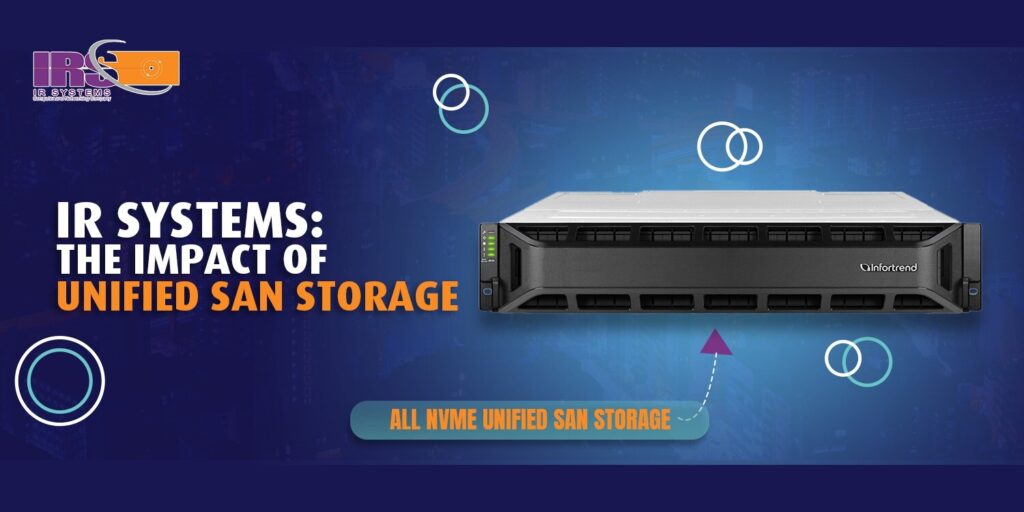
In the ever-evolving landscape of Information Retrieval (IR) systems, storage solutions play a crucial role in determining efficiency, scalability, and performance. Among the latest advancements, Unified Storage Area Network (SAN) solutions have emerged as a game-changer. Let’s explore how Unified SAN Storage is reshaping IR systems across various domains. Understanding Unified SAN Storage This Storage represents a convergence of storage technologies, combining block-level storage for high-performance applications with file-level storage for data sharing and management. This integrated approach offers a single, cohesive platform for storing and accessing diverse data types, streamlining management, and enhancing overall efficiency in IR systems. Enhancing Data Accessibility One of the primary advantages of Storage in IR systems is its ability to provide seamless access to data across heterogeneous environments. By consolidating storage resources into a unified pool, organizations can eliminate data silos and enable smoother data sharing and collaboration. Whether it’s structured data in databases or unstructured content in files, Storage ensures consistent accessibility, facilitating faster information retrieval and analysis. Improving Performance and Scalability Performance and scalability are paramount in IR systems, where rapid data retrieval and processing are essential. This Storage leverages advanced technologies such as flash storage and automated tiring to deliver high-performance, scalable storage solutions. This enables IR systems to handle growing data volumes and increasing user demands without compromising on speed or responsiveness. Streamlining Management and Administration Managing storage infrastructure can be complex, especially in large-scale IR systems with diverse storage requirements. Unified SAN Storage simplifies management by providing a single interface for configuring, provisioning, and monitoring storage resources. Centralized management capabilities enhance efficiency, reduce administrative overhead, and enable IT teams to allocate resources more effectively, ensuring optimal performance and resource utilization in IR systems. Ensuring Data Security and Compliance Data security and compliance are top priorities for organizations operating in sensitive industries or handling confidential information. This Storage offers robust data protection features such as encryption, access controls, and data integrity mechanisms, helping organizations meet regulatory requirements and safeguard sensitive data assets. By consolidating storage resources and implementing unified security policies, IR systems can mitigate risks and enhance data privacy and compliance. Unified SAN Storage represents a significant advancement in storage technology, offering a unified approach to storing and managing data in IR systems. By combining performance, scalability, and management simplicity, the Storage solutions empower organizations to unlock the full potential of their IR systems, enabling faster data retrieval, improved efficiency, and enhanced data security. As the demand for advanced information retrieval capabilities continues to grow, Unified SAN Storage will play an increasingly vital role in shaping the future of IR systems across industries.
